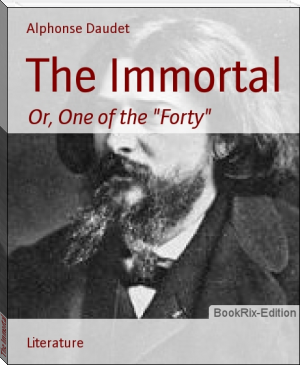Jack by Alphonse Daudet (web ebook reader txt) 📖

- Author: Alphonse Daudet
Book online «Jack by Alphonse Daudet (web ebook reader txt) 📖». Author Alphonse Daudet
For two days Jack carried this money with pride in his pocket. He would go to Nantes and buy a new suit. What a delight it would be! and how kind his mother was! One thing troubled him: What could he purchase for Zenaide; he must first see what she had.
So thinking one dark night, as he entered the house, he ran against some one who was coming down the steps.
"Is that you, Belisaire?"
There was no reply, but as Jack pushed open the door, he saw that he was not mistaken, that Belisaire had been there.
Clarisse was in the corridor, shivering with the cold, and so absorbed by the letter she was reading in the gleam of light from the half open door of the parlor, that she did not even look up as Jack went in. The letter evidently contained some startling intelligence, and the boy suddenly remembered having that day heard that Chariot had lost a large sum of money in gambling with the crew of an English ship that had just arrived at Nantes from Calcutta.
In the parlor Zenaide and Maugin were alone.
Pere Rondic had gone to Chateaubriand and would not return until the next day, which did not prevent her future husband from dining with them. He sat in the large arm-chair, his feet comfortably extended. While Zenaide, carefully dressed, and her hair arranged by her stepmother, laid the table, this calm and reasonable lover entertained her by an estimate of the prices of the various grains, indigos, and oils that entered the port of Nantes. And such a wonderful prestidigitateur is love that Zenaide was moved to the depths of her soul by these details, and listened to them as to music.
Jack's entrance disturbed the lovers. "Ah, here is Jack I I had no idea it was so late!" cried the girl. "And mamma, where is she?"
Clarisse came in, pale but calm.
"Poor woman!" thought Jack, as he watched her trying to smile, to talk, and to eat, swallowing at intervals great draughts of water, as if to choke down some terrible emotion. Zenaide was blind to all this. She had lost her own appetite, and watched her soldier's plate, seeming delighted at the rapidity with which the delicate morsels disappeared.
Maugin talked well, and ate and drank with marvellous appetite; he weighed his words as carefully as he did the square bits into which he cut his bread; he held his wine-glass to the light, testing and scrutinizing it each time he drank. A dinner, with him, was evidently a matter of importance as well as of time. This evening it seemed as if Clarisse could not endure it; she rose from the table, went to the window, listened to the rattling of the hail on the glass, and then turning round, said,--
"What a night it is, M. Maugin I I wish you were safely at home."
"I don't, then!" cried Zenaide, so earnestly that they all laughed. But the remark made by Clarisse bore its fruit, and the soldier rose to go. But it took him some time to get off. There was his lantern to light, his gloves to button; and the girl took all these duties on herself. At last the soldier was in readiness; his hood was pulled over his eyes, a scarf wound about his throat, then Zenaide said good night, and watched her Esquimau-looking lover somewhat anxiously down the street. What perils might he not have to run in that thick darkness!
Her stepmother called her impatiently. The nervous excitement of Clarisse had momentarily increased. Jack had noticed this, and also that she looked constantly at the clock.
"How cold it must be to-night on the Loire," said Zenaide.
"Cold, indeed!" answered Clarisse, with a shiver.
"Come," she said, as the clock struck ten, "let us go to bed."
Then seeing that Jack was about to lock the outer door as usual, she stopped him, saying,--
"I have done it myself. Let us go up stairs."
But Zenaide had not finished talking of M. Maugin. "Do you like his moustache, Jack?" she asked.
"Will you go to bed?" asked Madame Rondic, pretending to laugh, but trembling nervously.
At last the three are on the narrow staircase.
"Good night," said Clarisse; "I am dying with sleep."
But her eyes were very bright. Jack put his foot on his ladder, but Zenaide's room was so crowded with her gifts and purchases, that it seemed to him a most auspicious occasion to pass them in review. Friends had had them under examination, and they were still displayed on the commode: some silver spoons, a prayer-book, gloves, and all about tumbled bits of paper and the colored ribbon that had fastened these gifts from the chateau; then came the more humble presents from the wives of the employes. Zenaide showed them all with pride. The boy uttered exclamations of wonder. "But what shall I give her?" he said to himself over and over again.
"And my trousseau, Jack, you have not seen it! Wait, and I will show it to you."
With a quaint old key she opened the carved wardrobe that had been in the family for a hundred years; the two doors swung open, a delicious violet perfume filled the room, and Jack could see and admire the piles of sheets spun by the first Madame Rondic, and the ruffled and fluted linen piled in snowy masses.
In fact, Jack had never seen such a display. His mother's wardrobe held laces and fine embroideries, not household articles. Then, lifting a heavy pile, she showed Jack a casket. "Guess what is in this," Zenaide said, with a laugh; "it contains my dowry, my dear little dowry, that in a fortnight will belong to M. Maugin. Ah, when I think of it, I could sing and dance with joy!"
And the girl held out her skirts with each hand, and executed an elephantine gambol, shaking the casket she still held in her hand. Suddenly she stopped; some one had rapped on the wall.
"Let the boy go to bed," said her stepmother in an irritated tone; "you know he must be up early."
A little ashamed, the future Madame Maugin shut her wardrobe, and said good night to Jack, who ascended his ladder; and five minutes later the little house, wrapped in snow and rocked by the wind, slept like its neighbors in the silence of the night.
There is no light in the parlor of the Rondic mansion save that which comes from the fitful gleam of the dying fire in the chimney. A woman sat there, and at her feet knelt a man in vehement supplication.
"I entreat you," he whispered, "if you love me--"
If she loved him! Had she not at his command left the door open that he might enter? Had she not adorned herself in the dress and ornaments that he liked, to make herself beautiful in his eyes? What could it be that he was asking her now to grant to him? How was it that she, usually so weak, was now so strong in her denials? Let us listen for a moment.
"No, no," she answered, indignantly, "it is impossible."
"But I only ask it for two days, Clarisse. With these six thousand francs I will pay the five thousand I have lost, and with the other thousand I will conquer fortune."
She looked at him with an expression of absolute terror.
"No, no," she repeated, "it cannot be. You must find some other way."
"But there is none."
"Listen. I have a rich friend; I will write to her and ask her to lend me the money."
"But I must have it to-morrow."
"Well, then, find the Director; tell him the truth."
"And he will dismiss me instantly. No; my plan is much the best. In two days I will restore the money."
"You only say that."
"I swear it." And, seeing that his words did not convince her, he added, "I had better have said nothing to you, but have gone at once to the wardrobe and taken what I needed."
But she answered, trembling, for she feared that he would yet do this, "Do you not know that Zenaide counts her money every day? This very night she showed the casket to the apprentice."
Chariot started. "Is that so?" he asked.
"Yes; the poor girl is very happy. It would kill her to lose it. Besides, the key is not in the wardrobe."
Suddenly perceiving that she was weakening her own position, she was silent. The young man was no longer the supplicating lover, he was the spoiled child of the house, imploring his aunt to save him from dishonor.
Through her tears she mechanically repeated the words, "It is impossible."
Suddenly he rose to his feet.
"You will not? Very good. Only one thing remains then. Farewell! I will not survive disgrace."
He expected a cry. No; she came toward him.
"You wish to die! Ah, well, so do I! I have had enough of life, of shame, of falsehood, and of love--love that must be concealed with such care that I am never sure of finding it. I am ready."
He drew back. "What folly!" he said, sullenly. "This is too much," he added, vehemently, after a moment's silence, and hurried to the stairs.
She followed him. "Where are you going?" she asked.
"Leave me!" he said, roughly. She snatched his arm.
"Take care!" she whispered with quivering lips. "If you take one more step in that direction, I will call for assistance!"
"Call, then! Let the world know that your nephew is your lover, and your lover a thief."
He hissed these words, in her ear, for they both spoke very low, impressed, in spite of themselves, by the silence and repose of the house. By the red light of the dying fire he appeared to her suddenly in his true colors, just what he really was, unmasked by one of those violent emotions which show the inner workings of the soul.
She saw him with his keen eyes reddened by constant examination of the cards; she thought of all she had sacrificed for this man; she remembered the care with which she had adorned herself for this interview. Suddenly she was overwhelmed by profound disgust for herself and for him, and sank, half-fainting, on the couch; and while the thief crept up the familiar staircase, she buried her face in the pillows to stifle her cries and sobs, and to prevent herself from seeing and hearing anything.
The streets of Indret were as dark as at midnight, for it was not yet six o'clock. Here and there a light from a baker's window or a wine-shop shone dimly through the thick fog. In one of these wineshops sat Chariot and Jack.
"Another glass, my boy!"
"No more, thank you. I fear it would make me very ill."
Chariot laughed. "And you a Parisian! Waiter, bring more wine!"
The boy dared make no farther objection. The attentions of which he was the object flattered him immensely. That this man, who for eighteen months had never vouchsafed him any notice, should, meeting him by chance that morning in the streets, have invited him to the cabaret and treated him, was a matter of surprise and congratulation to himself. At first Jack was somewhat distrustful of such courtesy, for the other had such a singular way of repeating his question, "Is there nothing new at the Rondics? Really, nothing new?"
"I wonder," thought the apprentice, "if he wishes me to carry his letters, instead of Belisaire!"
But after a little while the boy became more at ease. Perhaps Chariot, he thought, may not be such a bad fellow. A good friend might induce him to relinquish play, and make him a better man.
After
 Have you ever thought about what fiction is? Probably, such a question may seem surprising: and so everything is clear. Every person throughout his life has to repeatedly create the works he needs for specific purposes - statements, autobiographies, dictations - using not gypsum or clay, not musical notes, not paints, but just a word. At the same time, almost every person will be very surprised if he is told that he thereby created a work of fiction, which is very different from visual art, music and sculpture making. However, everyone understands that a student's essay or dictation is fundamentally different from novels, short stories, news that are created by professional writers. In the works of professionals there is the most important difference - excogitation. But, oddly enough, in a school literature course, you don’t realize the full power of fiction. So using our website in your free time discover fiction for yourself.
Have you ever thought about what fiction is? Probably, such a question may seem surprising: and so everything is clear. Every person throughout his life has to repeatedly create the works he needs for specific purposes - statements, autobiographies, dictations - using not gypsum or clay, not musical notes, not paints, but just a word. At the same time, almost every person will be very surprised if he is told that he thereby created a work of fiction, which is very different from visual art, music and sculpture making. However, everyone understands that a student's essay or dictation is fundamentally different from novels, short stories, news that are created by professional writers. In the works of professionals there is the most important difference - excogitation. But, oddly enough, in a school literature course, you don’t realize the full power of fiction. So using our website in your free time discover fiction for yourself. 




Comments (0)